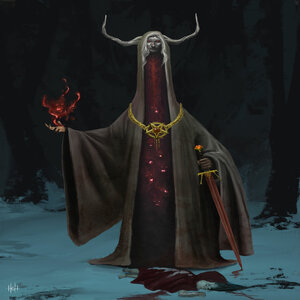
Perchta
CBUB Wins: 0
CBUB Losses: 0
CBUB Ties: 0
Win Percentage: 0%
Added by: Macklemore
Read more about Perchta at: Wikipedia
Official Site: Public Domain
or (English: Bertha), also commonly known as and other variations, was once known as a goddess in Alpine paganism in the Upper German and Austrian regions of the Alps. Her name may mean "the bright one" ( , from Proto-Germanic *berhtaz) and is probably related to the name , meaning the feast of the Epiphany. Eugen Mogk provides an alternative etymology, attributing the origin of the name to the Old High German verb , meaning "hidden" or "covered".
Perchta is often identified as stemming from the same Germanic goddess as Holda and other female figures of Germanic folklore (see Frija-Frigg). According to Jacob Grimm and Lotte Motz, Perchta is Holda's southern cousin or equivalent, as they both share the role of "guardian of the beasts" and appear during the Twelve Days of Christmas, when they oversee spinning.
Grimm says Perchta or Berchta was known "precisely in those Upper German regions where Holda leaves off, in Swabia, in Alsace, in Switzerland, in Bavaria and Austria."
According to Erika Timm, Perchta emerged from an amalgamation of Germanic and pre-Germanic, probably Celtic, traditions of the Alpine regions after the Migration Period in the Early Middle Ages.
CBUB Match Record:
No Regular Play Records Available
No Fantasy Draft Records Available
